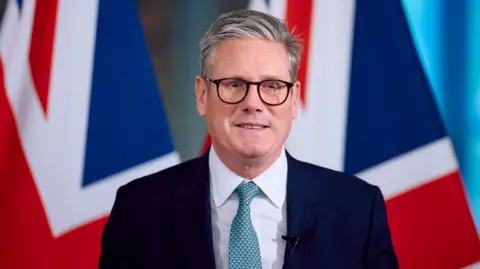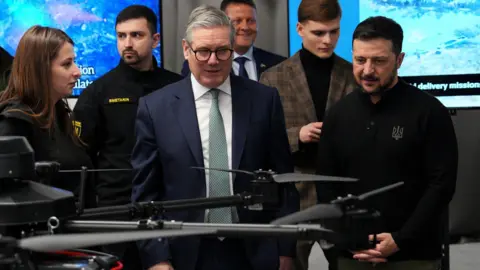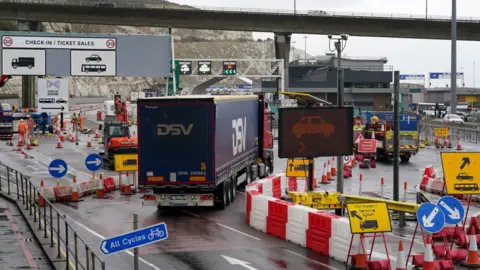Starmer first PM to join EU leaders' meeting since Brexit
 Getty Images
Getty ImagesSir Keir Starmer is heading to Brussels to join a gathering of European Union leaders – the first time a British prime minister has done so since Brexit.
Starmer is heading over the English Channel for talks focused on defence and security co-operation and will also meet Nato Secretary General Mark Rutte.
The trip is part of what he calls a "reset" between the UK and the European Union.
The government has promised the UK will not re-join the EU's Single Market or Customs Union, or sign up to freedom of movement.
But ministers do want what they see as a better relationship on defence and security, crime and trade.
They hope to sort this out by the spring and finalise it at a UK-EU summit, possibly in April or May.
Leaders of the European Union's 27 member states are gathering for what is described as an "informal retreat" at the Palais d'Egmont in Brussels - a 16th century palace in heart of the Belgian capital.
The backdrop is clear: the ongoing war in Ukraine and the return of Donald Trump to the White House.
The EU acknowledges it needs to take greater responsibility for its own defence – a key and recurring demand of President Trump, as he threatens the bloc with import taxes or tariffs.
The prime minister said: "President Trump has threatened more sanctions on Russia and it's clear that's got Putin rattled. We know that he's worried about the state of the Russian economy.
"I'm here to work with our European partners on keeping up the pressure, targeting the energy revenues and the companies supplying his missile factories to crush Putin's war machine.
"Because ultimately, alongside our military support, that is what will bring peace closer."
 PA Media
PA MediaThe UK is also exploring closer ties with the EU on dealing with serious and organised crime, and, crucially, trade.
Allowing food and animal products to be traded more freely is being discussed, as is cooperation on energy with a possible tie-up between the UK and the EU's emission trading schemes.
The mutual recognition of professional qualifications and allowing touring musicians to travel more easily are also themes of interest.
Plenty in the EU are keen on a youth mobility scheme allowing young people from the UK and the EU to travel much more easily.
But such a scheme will sound to some rather like freedom of movement, albeit for a narrow chunk of the population and so may be a hard sell for the UK politically.
 PA Media
PA MediaIt is also likely, given the respective sizes of the EU and the UK, that more young people from the EU would come to the UK than vice versa.
Ministers have rejected the idea so far.
The EU has also floated the UK joining what is known as the Pan-Euro-Mediterranean Convention.
The Convention isn't quite a customs union but removes customs on the components that go into a product that are sourced from the other countries signed up to it.
Notably, the UK has not ruled out signing up to this and it is not seen by the government as a breach of its red lines.
Some sectors, such as the car industry, with its 'just in time' supply chains, would likely welcome such a move but other manufacturers would be exposed to greater competition.
Leading the technical negotiations for the UK is Michael Ellam, who worked in Downing Street when Gordon Brown was prime minister.
Ellam has been tasked with managing what is known as the "the EU Relations Secretariat" within the Cabinet Office, which the prime m inister set up shortly after the general election to lead on his planned "reset" with the EU.
As the negotiations continue, Starmer knows he faces political pressure from both sides of the argument.
Conservative leader Kemi Badenoch has claimed "the Labour government are trying to reopen the divisions of the past and edge us back into the EU."
Sir Ed Davey, leader of the Liberal Democrats, has said the government should be negotiating to re-join the customs union.
